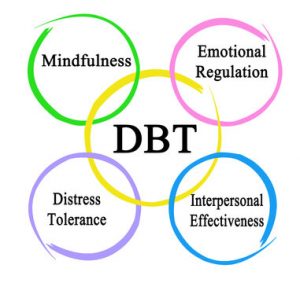 In the world of DBT, there are three types of ‘mind’ states: emotion mind, reasonable mind, and wise mind. If you’ve ever lost your temper (who of us hasn’t!), then you’ve experienced emotion mind. Emotion mind doesn’t refer only to negative emotions, though — you might be in emotion mind when you’re feeling deeply in love with your new puppy. The point is, emotion mind is characterized by strong, intense emotional experiences. Reasonable mind, on the other hand, I often think of as ‘thinking mode’. When you’re doing your taxes or measuring the ingredients for a recipe, for example, you’re probably thinking with your reasonable mind. Wise mind is the overlap between emotion mind and reasonable mind. It’s a mix of both emotion and logic.
In the world of DBT, there are three types of ‘mind’ states: emotion mind, reasonable mind, and wise mind. If you’ve ever lost your temper (who of us hasn’t!), then you’ve experienced emotion mind. Emotion mind doesn’t refer only to negative emotions, though — you might be in emotion mind when you’re feeling deeply in love with your new puppy. The point is, emotion mind is characterized by strong, intense emotional experiences. Reasonable mind, on the other hand, I often think of as ‘thinking mode’. When you’re doing your taxes or measuring the ingredients for a recipe, for example, you’re probably thinking with your reasonable mind. Wise mind is the overlap between emotion mind and reasonable mind. It’s a mix of both emotion and logic.
 Some say that Dr. Marsha Linehan, who founded DBT, describes wise mind as “that part of each person that can know and experience truth. It is almost always quiet. It has a certain peace. It is where the person knows something in a centered way.” It feels different to everyone, but it’s often discussed as a feeling of intuition or a ‘gut-feeling’. You’re not being driven only by emotion and ignoring the logic of an upsetting situation. You’re also not being driven solely by logic and ignoring the emotional experience. Instead, you’re listening for and acknowledging the emotional experience, taking it in with a cool sense of logic and using both to inform your next steps. Check out this brief video to hear Dr. Marsha Linehan speak about this!
Some say that Dr. Marsha Linehan, who founded DBT, describes wise mind as “that part of each person that can know and experience truth. It is almost always quiet. It has a certain peace. It is where the person knows something in a centered way.” It feels different to everyone, but it’s often discussed as a feeling of intuition or a ‘gut-feeling’. You’re not being driven only by emotion and ignoring the logic of an upsetting situation. You’re also not being driven solely by logic and ignoring the emotional experience. Instead, you’re listening for and acknowledging the emotional experience, taking it in with a cool sense of logic and using both to inform your next steps. Check out this brief video to hear Dr. Marsha Linehan speak about this!
 In my experience, helping clients find and use your wise mind can help with all kinds of things: the mental load, parenting gifted children, experiencing and expressing gratitude, regulating your emotions, and so much more. There are also loads of resources to help! If you think this kind of skill-building sounds like something that could help you, why not look for a DBT group near you or a coach trained in using these techniques? There are also all kinds of books and resources out there for you to explore!
In my experience, helping clients find and use your wise mind can help with all kinds of things: the mental load, parenting gifted children, experiencing and expressing gratitude, regulating your emotions, and so much more. There are also loads of resources to help! If you think this kind of skill-building sounds like something that could help you, why not look for a DBT group near you or a coach trained in using these techniques? There are also all kinds of books and resources out there for you to explore!
